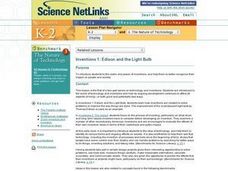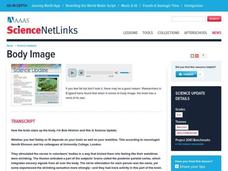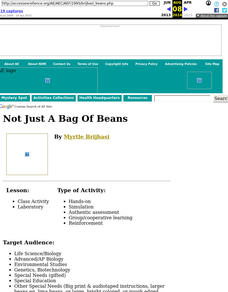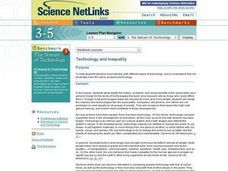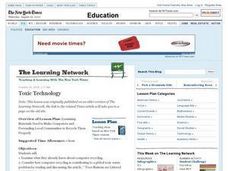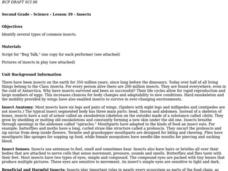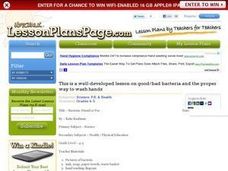Curated OER
Inventions 1: Edison And The Light Bulb
Students examine the realm and power of inventions, and recognize their impact on people and society. Small groups pretend to have been hired by Edison to make special posters that advertise the uses and benefits of the light bulb.
Curated OER
Characteristics of Snakes and Turtles
Young scholars examine the characteristics of snakes and turtles and compare/contrast reptiles with mammals. They watch a video, answer discussion questions, complete information charts, conduct Internet research, and create a habitat...
Curated OER
Smart Move!
Students visualize a communication system. They encode, decode, transmit, receive and store messages. Students use a code sheet and flashlight for this process. They will also maintain a storage sheet from which they can retrieve...
Curated OER
Body Image
High schoolers read and answer questions on neural processing and the Pinocchio Illusion. They relate and discuss these topics in conjunction with body-image disorders such as anorexia and bulimia . This activity include video extension...
Curated OER
Eutrophication Experiments
Observe two different water samples and write down observations. Write a paragraph which predicts the relative amounts of nutrients, nitrates, and phosphates in the water samples. Compare water samples under a microscope.
Curated OER
The Role of Enzymes
Students explore the role of enzymes in chemical reactions. In this enzymes lesson plan, students use hydrogen peroxide and manganese dioxide to observe a chemical reaction. Students observe the rates of reactions of chalk, hamburger,...
Curated OER
Graze Like a Cow
Students explore how a cow digests the grass they eat. In this science/math lesson, students compare the quality of forage. Additionally, students determine the effects of rangeland health on the production.
Curated OER
Dietary Fiber
Learners examine the different types of fiber and their benefits. In this investigative lesson students find good sources of fiber in different foods.
Curated OER
Edison and the Light Bulb
Learners explore the impact of inventions on society, specifically Edison and the light bulb. In this technology lesson plan, students use online resources and listen to a story about Edison to develop an understanding of how the light...
Curated OER
Rate of Photosynthesis
Students investigate the rate of photosynthesis using elodea leaves. In this photosynthesis lesson plan, students place elodea in a test tube filled with water. They include baking soda and place the test tube under a lamp. Students...
Curated OER
Build a Polyp
Learners research coral polyps. For this coral polyps lesson, students discover the anatomy of a coral polyp and how they feed. Learners create an edible coral polyp model.
Curated OER
Not Just a Bag of Beans
Young scholars determine the types of natural selection and variation that exists in a population, using beans.
Curated OER
How Does a Green Plant Grow?
Students of all ages can explore the question "how do seeds grow?", design an experiment to answer the question, predict the outcome of the experiment then conduct the experiment.
Curated OER
Eggs: A Practical Application
Apply food selection and preparation guidelines related to egg products. National Standard 14.3.3 Identify functions of eggs: binder, thickener, coating, leavening agent, emulsifier Identify egg cooking temperatures, techniques/methods:...
Curated OER
Technology and Inequality
Students study briefly the history, evolution, and social benefits of the automobile. After using the automobile as a case study, students choose another technology, research, and analyze it in small groups and report.
Curated OER
Free Speech or Hate Speech?
High schoolers see the difference between protected and prohibited speech as guaranteed by the First Amendment. They explain why free speech is essential to a democracy and consider how best to deal with speech they find offensive.
Curated OER
TOXIC TECHNOLOGY
Students examine what they already know about computer recycling and cconsider how computer recycling is contributing to a global toxic waste problem by reading and discussing the article, ""Poor Nations are Littered With Old PC's,...
Curated OER
Healthy Heart
Students explore how the heart works, examine pictures of a troubled heart, and discuss how to keep the heart healthy.
Curated OER
Insects
Second graders brainstorm and identify several types of common insects. They play bug bingo, building bugs and an insect tree, observing real insects in the classroom and examining some of the things insects make.
Curated OER
How Do Flowering Plants Reproduce
Students investigate how flowering plants reproduce. They identify and describe the functions of the major sexual organs of a flower and fruit by examining and dissecting flowers and fruit.
Curated OER
The Skeletal System
Students identify bones off a skeleton during quizzes; assemble disarticulated skeletons; bird, frog and rat. They dissect frogs, remove the muscle tissue, and identify of bones.
Curated OER
What's Inside
Students become more familiar with life science in the context of the scientific method which helps them to become familiar with the various kinds of life science diagrams they may see on a GED science test.
Curated OER
Bacteria: Friend or Foe?
Students examine a variety of environmental and industrial roles of bacteria. explore where bacteria can be found and distinguish bacteria from other organisms.
Curated OER
What Makes Bones Strong?
Students explore the function of bone, muscle, and skin. Pasta and rubber bands are used to model how minerals and collagen contribute to bone strength. The effects of the reduction of these substances are explored in chicken bones.
Other popular searches
- Animal Cell Parts
- Eukaryotic Cells Parts
- Parts of Cell Wall
- Animal Cell Parts Pictures
- Cell Function and Parts
- Animal Cell Parts Draw
- Label Animal Cell Parts
- Cell Types and Parts
- Label the Parts of a Cell
- Cells Parts
- Parts of Cello
- Eukaryote Cells Parts
